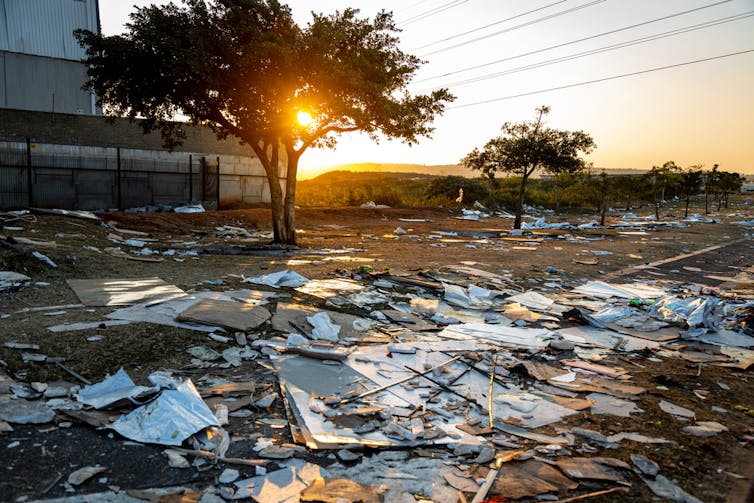
Anél du Plessis, North-West University; Angela van der Berg, University of the Western Cape, and Maricélle Botes, North-West University
The world is experiencing an environmental crisis coupled with rapid urbanisation. This affects city ecosystems, which are a combination of the built environment, planned green spaces and natural biodiversity. They include streets, roofs, parks, trees, rivers and other urban features.
Ecosystems provide services like regulating air, water and soil quality. In cities, their role in regulating the climate is particularly important. Cities are generally warmer than surrounding rural areas. Greenery and vegetation mitigate this by providing shade and filtering air. They also absorb greenhouse gases and other pollutants.
But ecosystem services are under threat everywhere in the world. Urban development and expansion causes ecological degradation, pollution and an increase in greenhouse gas emissions. This affects ecosystems’ ability to sustainably provide the services that people need for their physical and mental well-being.
In South Africa, these ecosystem services – like wetlands, green spaces and street trees – are grossly under-protected. They are at risk of being damaged irreparably. Intervention is necessary. Regulation in terms of law is one form of intervention.
South African law
South Africa has many environmental laws. These draw on a constitutional right to an environment that is not harmful to health and well-being. People have the right to protection of this environment through legislative and other measures.
The High Court has already found that local governments are “in the best position to know, understand, and deal with issues involving the environment at the local level”. But do these governments have the tools they need? To find out, we conducted a study to see whether South African law is suitable for protecting microclimate regulation in cities.
The main finding was that there are sufficient options in law to achieve this. But many of the legal instruments are underused; they also vary in their effectiveness. Innovative local governance is urgently needed. South African municipalities can and should experiment with a combination of instruments to achieve maximum results in protecting urban ecosystem services.
Instruments in law
The combination of national environmental law, local government law and spatial planning law in South Africa has many environmental governance instruments for municipalities to use. These include instruments for strategic and spatial planning and integrated environmental management. Some examples are municipal plans, land use schemes and environmental management plans. Others include environmental impact assessments and by-laws.
Cities can also use directives, compliance notices, incentives and agreements; one example is environmental management cooperation agreements between municipalities and the private sector. Then there are municipal advisory or ward committees. These instruments are all created in terms of local government and environmental laws promulgated by parliament since 1996.
But it’s the task of every municipality to adopt these instruments and to ensure they are suitable for local conditions. This is what the eThekwini Metro (Durban on South Africa’s east coast) did with its revised town planning scheme. The scheme looks to protect biodiversity and associated ecosystems.
Our study showed that environmental governance instruments vary in their ability to protect urban ecosystem services. Many are underexplored. We found that spatial planning and municipal by-laws are two potentially useful instruments.
Take the example of the Ekurhuleni Municipality in the east of Johannesburg. It used by-laws to establish consequences and penalties for damage to or removal of trees. Cape Town and Tshwane municipalities have bioregional plans that provide specifically for climate adaptation measures and ecosystem services.
Beyond the 2021 local government elections
The manifestos of the political parties that participated in the 2021 local government elections focused on local economic development and basic services. Environmental conservation and ecosystem protection were mostly overlooked. That’s an oversight: the benefits of these are critical to most other municipal activities.
Ecosystem services protection may not be part of annual municipal audits, but the entire government is obliged to comply with the constitutional environmental right. Everyone has a duty (legal and otherwise) to help address the impact of urbanisation on ecosystem integrity.
The elections ushered in a new start for municipalities. Most cities’ by-laws do not adequately regulate behaviour that may have a negative impact on ecosystem services. Innovative local governance is urgently needed. Municipalities are not bound to use only the legally prescribed instruments or use only a single instrument such as the well-known “municipal integrated development plan”. They are encouraged to try combinations that take local needs, local knowledge and community involvement into account. Municipalities should also compare short-term costs with long-term environmental and societal benefits.
Conclusion
Urban ecosystem services sustain life, but aren’t well protected. Newly elected councils should use the available legal tools. The skills, acumen and commitment of municipal administrations are equally important.
It is also up to local communities, scientists and community-based organisations to keep their municipalities to account. They can all contribute to the design and implementation of urban ecosystem protection measures - by complying with the law, for a start.![]()
Anél du Plessis, Professor of Law & NRF South African Research Chair in Cities, Law and Environmental Sustainability, North-West University; Angela van der Berg, Acting Director of the Global Environmental Law Centre, University of the Western Cape, and Maricélle Botes, PhD Researcher at the South African Research Chair in Cities, Law and Environmental Sustainability (CLES), North-West University
This article is republished from The Conversation under a Creative Commons license. Read the original article.

